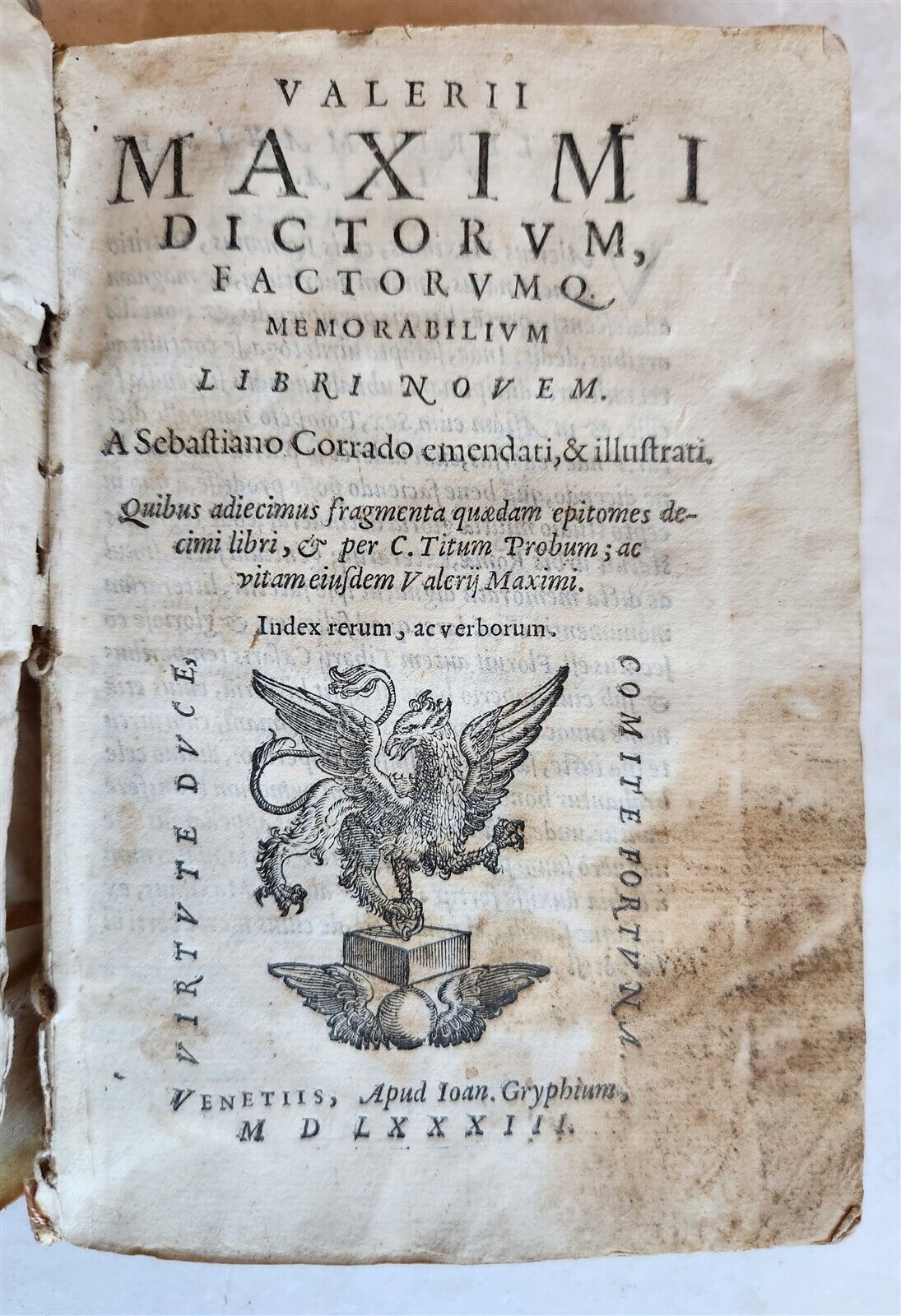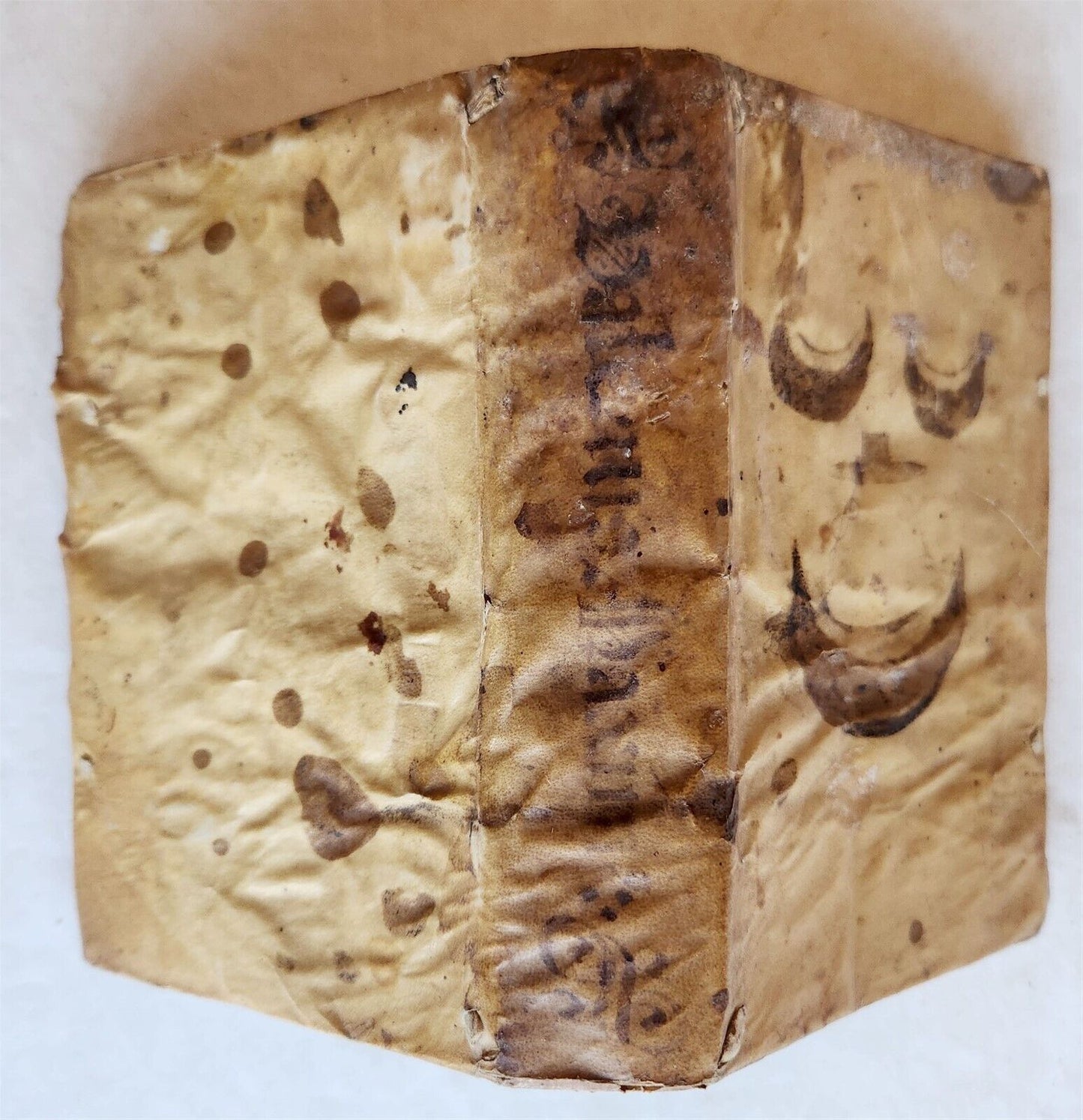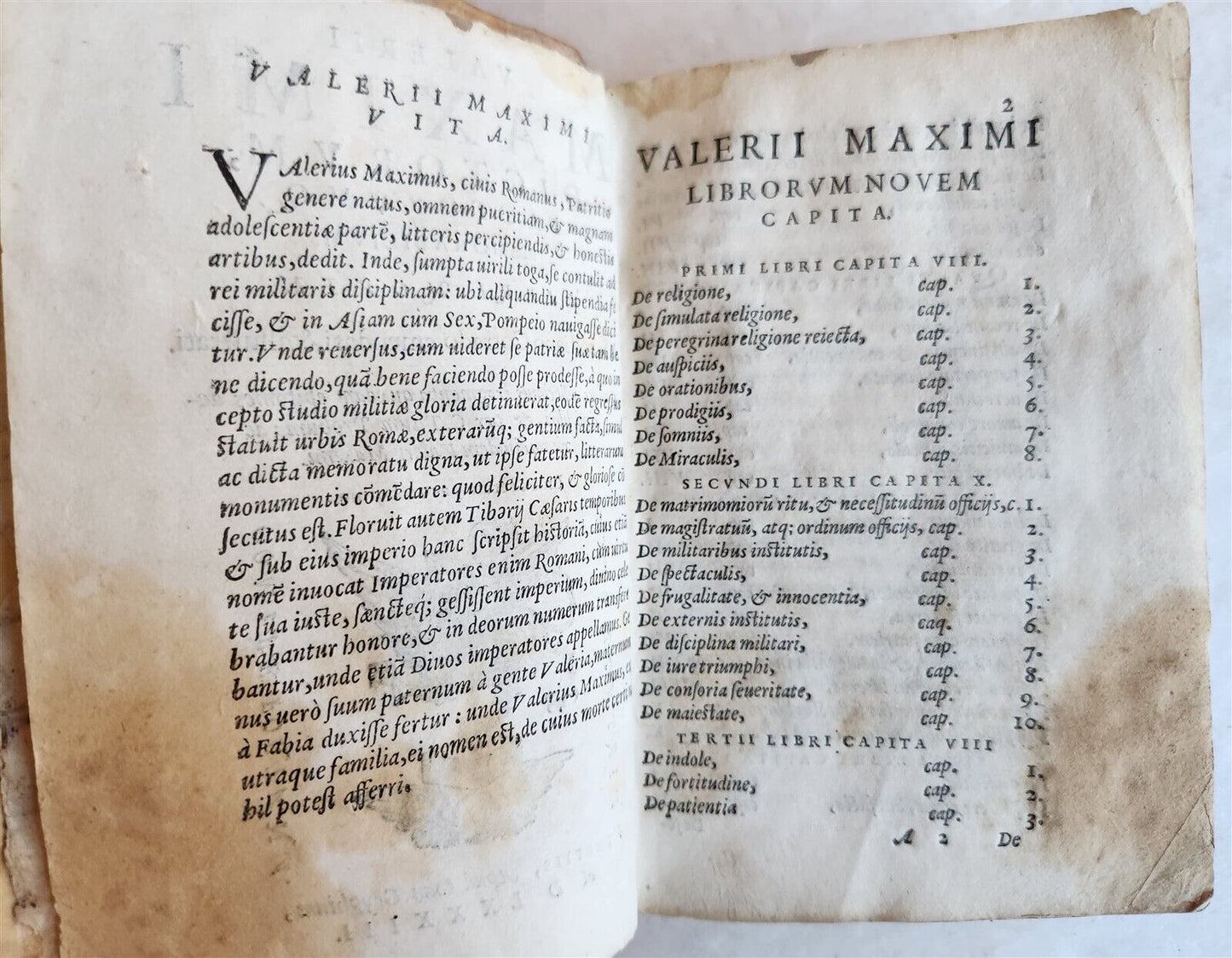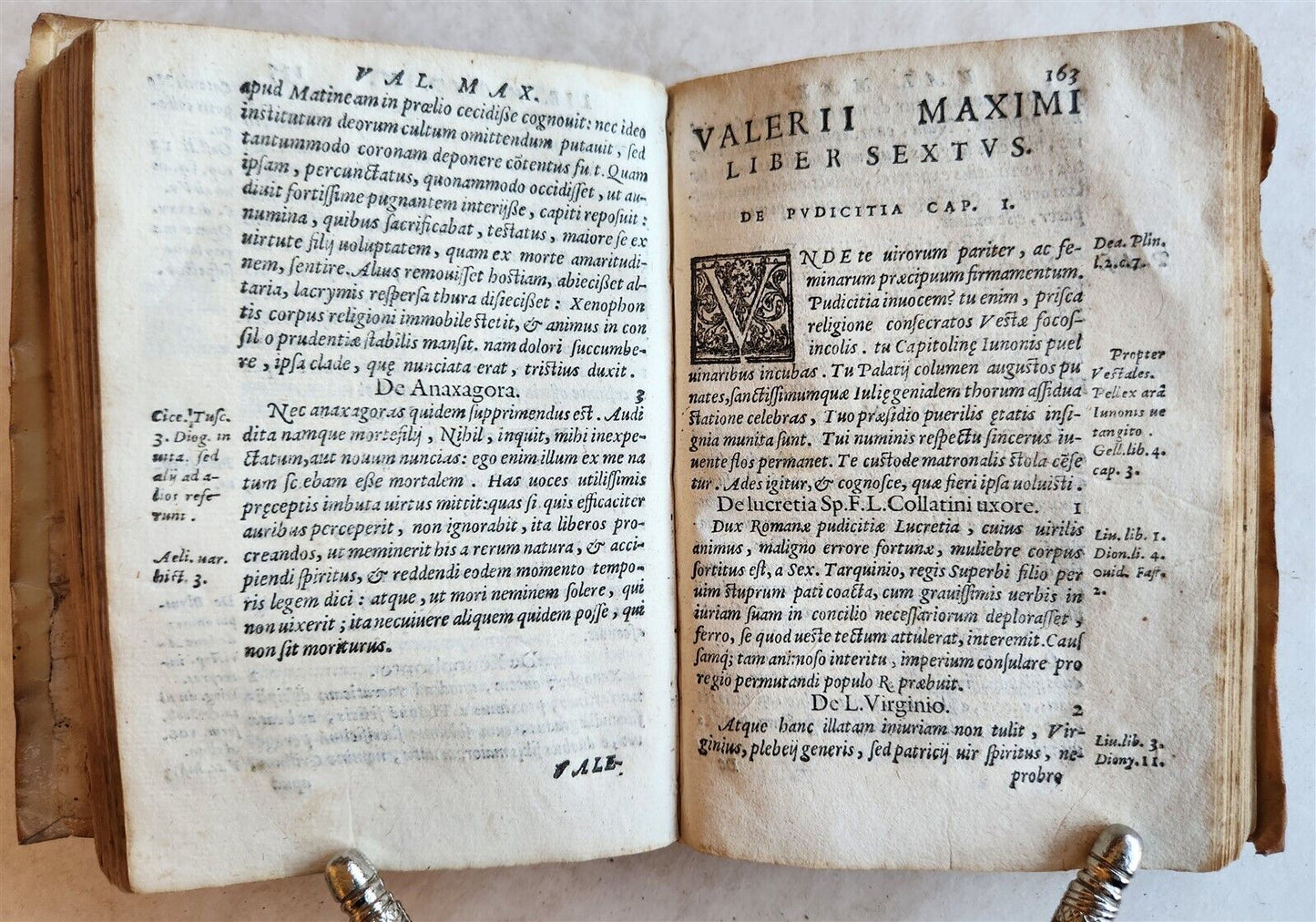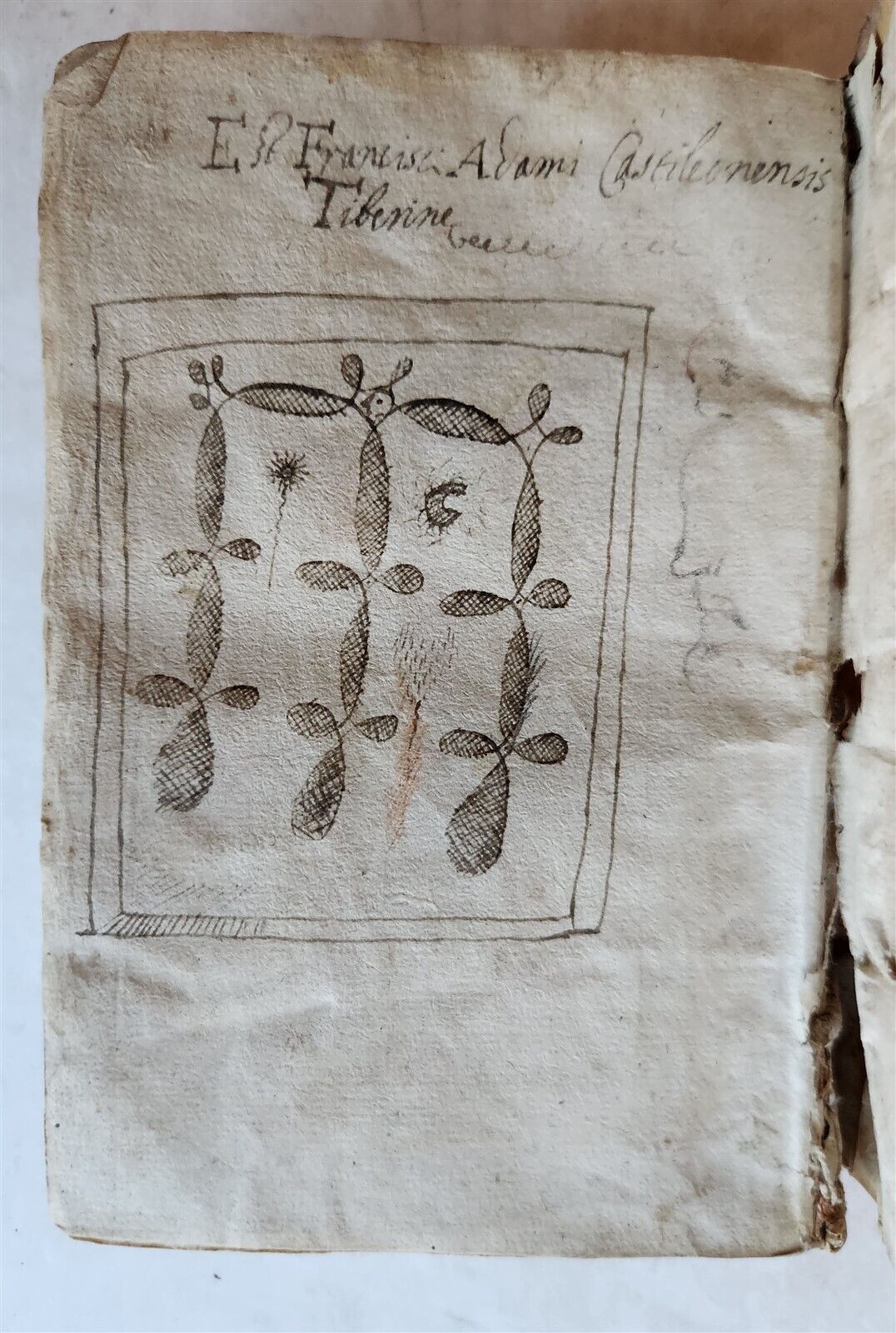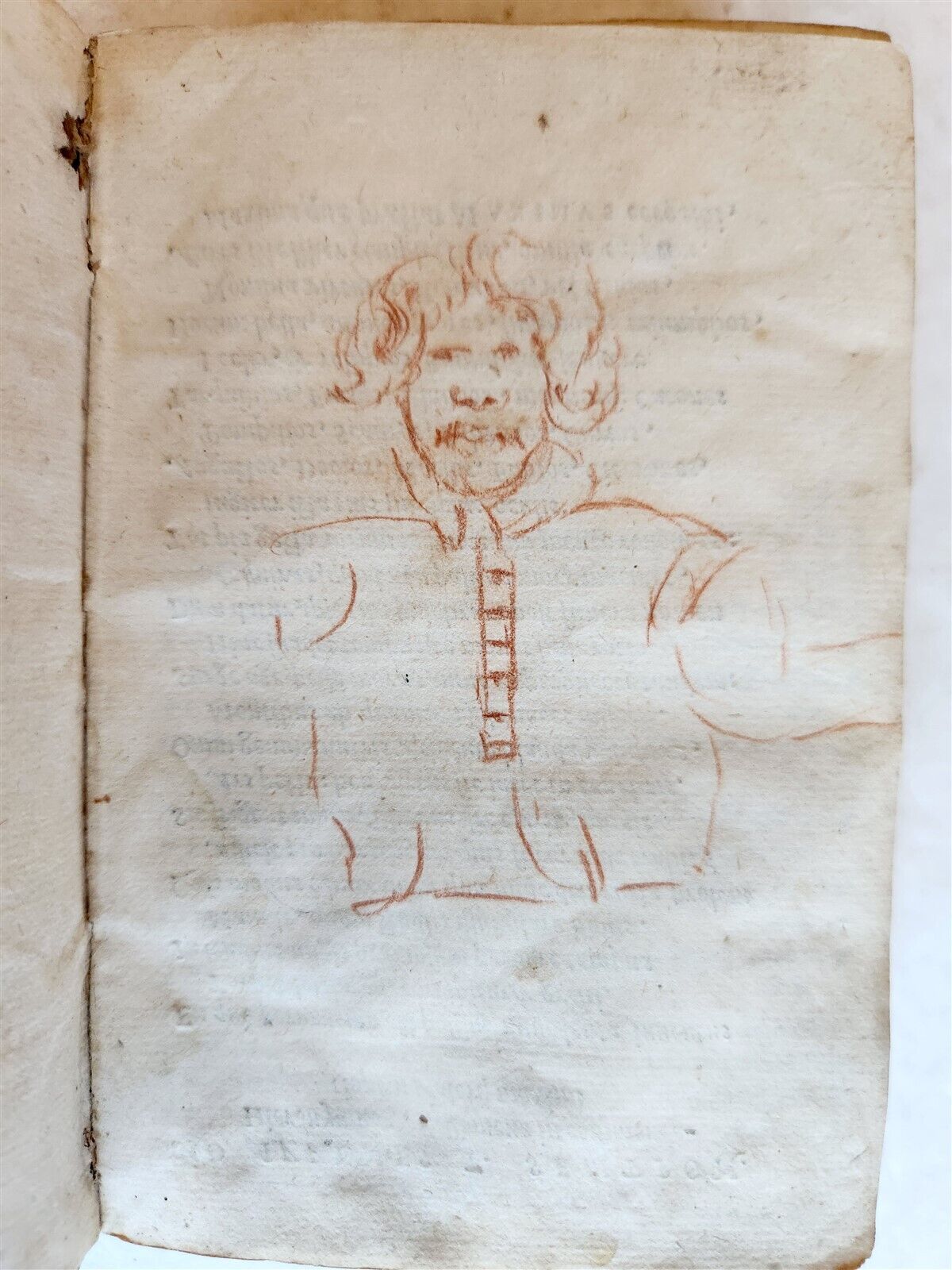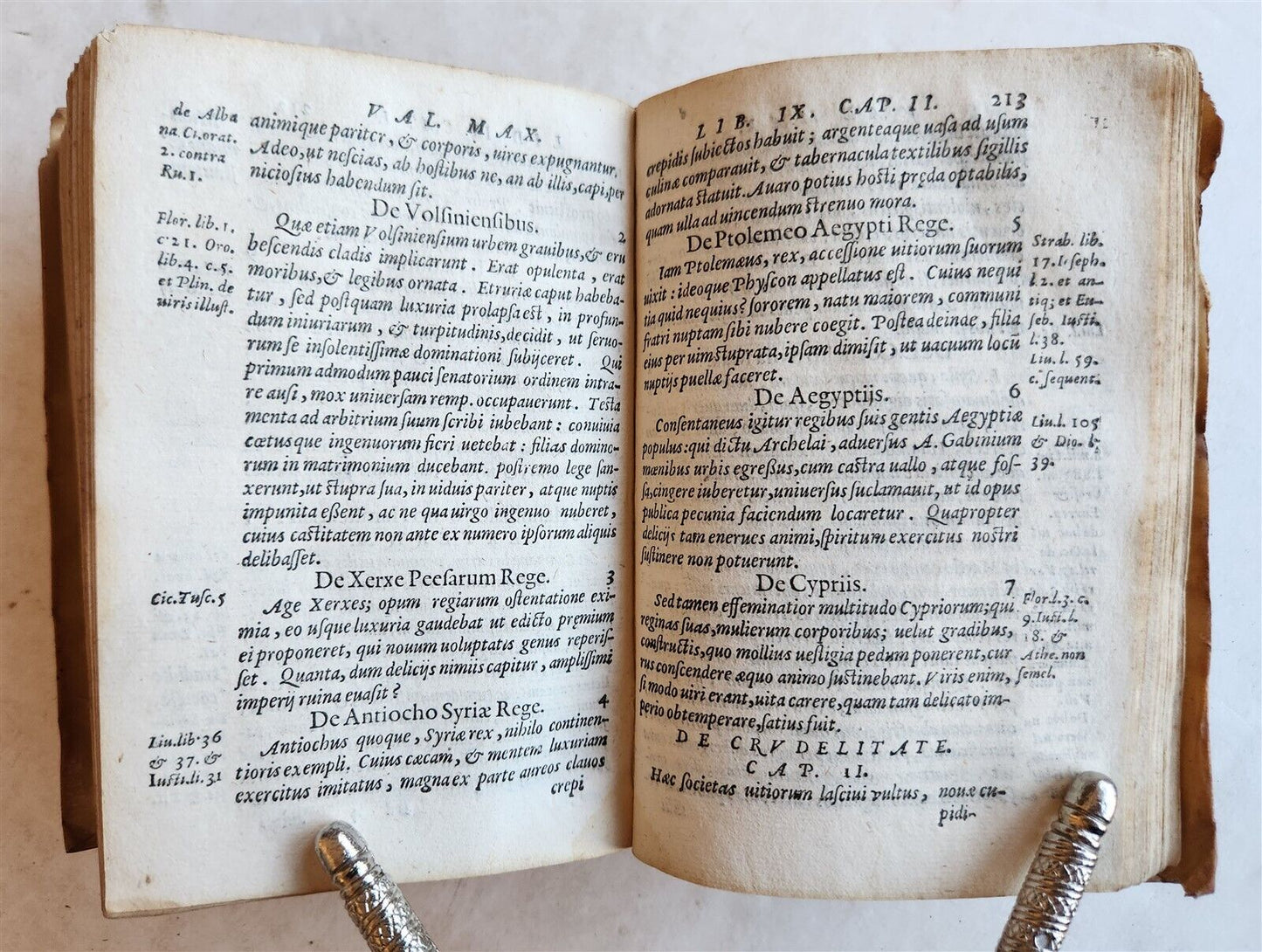Motka
1583 VALERII MAXIMI Dictorum Factorumq antique 16th CENTURY VELLUM BINDING
1583 VALERII MAXIMI Dictorum Factorumq antique 16th CENTURY VELLUM BINDING
Regular price
$424.90 USD
Regular price
$607.00 USD
Sale price
$424.90 USD
Unit price
per
Couldn't load pickup availability
Valerii MaximiDictorum Factorumq, memorabilium Libri Novem a Sebastiano Corrado emendati, & illustratiVenice by Ioan Gryphium; 1583238 numbered leaves and 10 unnumbered leaves at the end of the book.Original limp vellum , manuscript title at the spine, with spots. Spots at the lower right corner of first 3 leaves, old drawings at the endpapers and front pastedown and front coverMinor toningThe work is a sort of moral and civil anthology, it collects a vast range of anecdotes, stories and aphorisms taken from Roman and Greek history, with the aim of illustrating their vices and virtues.This edition is particularly important because it contains comments and annotations by Sebastiano Corrado which have contributed to clarifying and interpreting the original text.Woodcut printer's device on title-page. Text in Latin=====================
Factorum ac dictorum memorabilium libri IX ("nine books of memorable deeds and sayings", also known as De factis dictisque memorabilibus or Facta et dicta memorabilia) by Valerius Maximus (c. 20 BC – c. AD 50) was written around AD 30 or 31.It is a collection of approximately a thousand short stories that Valerius wrote during the reign of Tiberius (42 BC – AD 37).The stories are a variety of anecdotes illustrating how the ancient Romans lived.While the majority of the stories are of Roman life, he does have some foreign stories at the end of some chapters. Most of these are of Greek life and most of those are about Greek philosophers or famous kings.Several of the stories relate to moral subjects that parallel those in the Old Testament and New Testament. Valerius refers to his moral stories as "examples" that were to be used as moral guidance.Valerius' work on the preservation of moral values of the Roman Republic of the past was widely popular through the Age of Enlightenment, a literary life-span of some 1,700 years. People read Valerius' work for practical guidance in their everyday tasks for living a moral life.[4] This work was especially used as a reference by writers and professional orators.It is estimated that Valerius's work on these nine books took over a decade.He obtained material from Cicero, and from Livy, Sallust, Pompeius Trogus, Marcus Terentius Varro and other ancient historians.Each of the nine books has several chapters. Each chapter is outlined and grouped thematically and contains several stories illustrating that theme.This work is the earliest known use of a hierarchical organization system for topics of a book.There are a total of 91 chapters covering a wide variety of subjects drawn from Roman life. Valerius arranges his chapters focused on particular virtues, moral and immoral habits, religious practices, superstitions and ancient traditions. There is a thematic guide at the end of the work.==============================Please see my other auctions Thank You
Refund Policy: We will issue a FULL REFUND, 100% money back if you are not satisfied with your purchase. Items must be returned to us within 20 days in order to receive a refund or replacement. Buyer is responsible for shipping costs.
------------------------------------------------------------------------------------------------------------------------------------------------------------------------------------------------------------------------------------------------------------------------------------------------------------------------------------------------------------------------------------------------------------------------------------------------------------------------------------------------------------------------------------------------------------------------------------------------------------------------------------------------------------------------------------------------------------------------------------------------------------------------------------------------------------------------------------------------------------------------------------------------------------------------------------------------------------------------------------------------------------------------------------------------------------------------------------------------------------------------------------------------------------------------------------------------------------------------------------------------------------------------------------------------------------------------------------------------------------------------------------------------------------------------------------------------------------------------------------------------------------------------------------------------------------------------------------------------------------------------------------------------------------------------------------------------------------------------------------------------------------------------------------------------------------------------------------------------------------------------------------------------------------------------------------------------------------------------------------------------------------------------------------------------------------------------------------------------------------------------------------------------------------------------------------------------------------------------------------------------------------------------------------------------------------------------------------------------------------------------------------------------------------------------------------------------------------------------------------------------------------------------------------------------------------------------------------------------------------------------------------------------------------------------------------------------------------------------------------------------------------------------------------------------------------------------------------------------------------------------------------------------------------------------------------------------------------------------------------------------------------------------------------------------------------------------------------------------------------------------------------------------------------------------------------------------------------------------------------------------------------------------------
Valerii Maximi
Dictorum Factorumq, memorabilium Libri Novem a Sebastiano Corrado emendati, & illustrati
Venice by Ioan Gryphium; 1583
238 numbered leaves and 10 unnumbered leaves at the end of the book.
Original limp vellum , manuscript title at the spine, with spots
.
Spots at the lower right corner of first 3 leaves, old drawings at the endpapers and front pastedown and front cover
Minor toning
The work is a sort of moral and civil anthology, it collects a vast range of anecdotes, stories and aphorisms taken from Roman and Greek history, with the aim of illustrating their vices and virtues.
This edition is particularly important because it contains comments and annotations by Sebastiano Corrado which have contributed to clarifying and interpreting the original text.
Woodcut printer's device on title-page.
Text in Latin
=====================
Factorum ac dictorum memorabilium libri IX ("nine books of memorable deeds and sayings", also known as De factis dictisque memorabilibus or Facta et dicta memorabilia) by Valerius Maximus (c. 20 BC – c. AD 50) was written around AD 30 or 31.It is a collection of approximately a thousand short stories that Valerius wrote during the reign of Tiberius (42 BC – AD 37).The stories are a variety of anecdotes illustrating how the ancient Romans lived.While the majority of the stories are of Roman life, he does have some foreign stories at the end of some chapters. Most of these are of Greek life and most of those are about Greek philosophers or famous kings.Several of the stories relate to moral subjects that parallel those in the Old Testament and New Testament. Valerius refers to his moral stories as "examples" that were to be used as moral guidance.Valerius' work on the preservation of moral values of the Roman Republic of the past was widely popular through the Age of Enlightenment, a literary life-span of some 1,700 years. People read Valerius' work for practical guidance in their everyday tasks for living a moral life.[4] This work was especially used as a reference by writers and professional orators.It is estimated that Valerius's work on these nine books took over a decade.He obtained material from Cicero, and from Livy, Sallust, Pompeius Trogus, Marcus Terentius Varro and other ancient historians.Each of the nine books has several chapters. Each chapter is outlined and grouped thematically and contains several stories illustrating that theme.This work is the earliest known use of a hierarchical organization system for topics of a book.There are a total of 91 chapters covering a wide variety of subjects drawn from Roman life. Valerius arranges his chapters focused on particular virtues, moral and immoral habits, religious practices, superstitions and ancient traditions. There is a thematic guide at the end of the work.==============================
------------------------------------------------------------------------------------------------------------------------------------------------------------------------------------------------------------------------------------------------------------------------------------------------------------------------------------------------------------------------------------------------------------------------------------------------------------------------------------------------------------------------------------------------------------------------------------------------------------------------------------------------------------------------------------------------------------------------------------------------------------------------------------------------------------------------------------------------------------------------------------------------------------------------------------------------------------------------------------------------------------------------------------------------------------------------------------------------------------------------------------------------------------------------------------------------------------------------------------------------------------------------------------------------------------------------------------------------------------------------------------------------------------------------------------------------------------------------------------------------------------------------------------------------------------------------------------------------------------------------------------------------------------------------------------------------------------------------------------------------------------------------------------------------------------------------------------------------------------------------------------------------------------------------------------------------------------------------------------------------------------------------------------------------------------------------
Factorum ac dictorum memorabilium libri IX ("nine books of memorable deeds and sayings", also known as De factis dictisque memorabilibus or Facta et dicta memorabilia) by Valerius Maximus (c. 20 BC – c. AD 50) was written around AD 30 or 31.It is a collection of approximately a thousand short stories that Valerius wrote during the reign of Tiberius (42 BC – AD 37).The stories are a variety of anecdotes illustrating how the ancient Romans lived.While the majority of the stories are of Roman life, he does have some foreign stories at the end of some chapters. Most of these are of Greek life and most of those are about Greek philosophers or famous kings.Several of the stories relate to moral subjects that parallel those in the Old Testament and New Testament. Valerius refers to his moral stories as "examples" that were to be used as moral guidance.Valerius' work on the preservation of moral values of the Roman Republic of the past was widely popular through the Age of Enlightenment, a literary life-span of some 1,700 years. People read Valerius' work for practical guidance in their everyday tasks for living a moral life.[4] This work was especially used as a reference by writers and professional orators.It is estimated that Valerius's work on these nine books took over a decade.He obtained material from Cicero, and from Livy, Sallust, Pompeius Trogus, Marcus Terentius Varro and other ancient historians.Each of the nine books has several chapters. Each chapter is outlined and grouped thematically and contains several stories illustrating that theme.This work is the earliest known use of a hierarchical organization system for topics of a book.There are a total of 91 chapters covering a wide variety of subjects drawn from Roman life. Valerius arranges his chapters focused on particular virtues, moral and immoral habits, religious practices, superstitions and ancient traditions. There is a thematic guide at the end of the work.==============================
-----------------------------------------------------------------------------------------------------------------------------------------------------------------------------------------------------------------------------------------------------------------------------------------------------------------------------------------------------------------------------------------------------------------------------------------------------------------------------------------------------------------------------------------------------------------------------------------------------------------------------------------------------------------------------------------------------------------------------------------------------------------------------------------------------------------------------------------------------------------------------------------------------------------------------------------------------------------------------------------------------------------------------------------------------------------------------------------------------------------------------------------------------------------------------------------------------------------------------------------------------------------------------------------------------------------------------------------------------------------------------------------------------------------------------------------------------------------------------------------------------------------------------------------------------------------------------------------------------------------------------------------------------------------------------------------------------------------------------------------------------------------------------------------------------------------------------------------------------------------------------------------------------------------------------------------------------------------------------------------------------------------------------------------------------------------------
Factorum ac dictorum memorabilium libri IX ("nine books of memorable deeds and sayings", also known as De factis dictisque memorabilibus or Facta et dicta memorabilia) by Valerius Maximus (c. 20 BC – c. AD 50) was written around AD 30 or 31.It is a collection of approximately a thousand short stories that Valerius wrote during the reign of Tiberius (42 BC – AD 37).The stories are a variety of anecdotes illustrating how the ancient Romans lived.While the majority of the stories are of Roman life, he does have some foreign stories at the end of some chapters. Most of these are of Greek life and most of those are about Greek philosophers or famous kings.Several of the stories relate to moral subjects that parallel those in the Old Testament and New Testament. Valerius refers to his moral stories as "examples" that were to be used as moral guidance.Valerius' work on the preservation of moral values of the Roman Republic of the past was widely popular through the Age of Enlightenment, a literary life-span of some 1,700 years. People read Valerius' work for practical guidance in their everyday tasks for living a moral life.[4] This work was especially used as a reference by writers and professional orators.It is estimated that Valerius's work on these nine books took over a decade.He obtained material from Cicero, and from Livy, Sallust, Pompeius Trogus, Marcus Terentius Varro and other ancient historians.Each of the nine books has several chapters. Each chapter is outlined and grouped thematically and contains several stories illustrating that theme.This work is the earliest known use of a hierarchical organization system for topics of a book.There are a total of 91 chapters covering a wide variety of subjects drawn from Roman life. Valerius arranges his chapters focused on particular virtues, moral and immoral habits, religious practices, superstitions and ancient traditions. There is a thematic guide at the end of the work.==============================
----------------------------------------------------------------------------------------------------------------------------------------------------------------------------------------------------------------------------------------------------------------------------------------------------------------------------------------------------------------------------------------------------------------------------------------------------------------------------------------------------------------------------------------------------------------------------------------------------------------------------------------------------------------------------------------------------------------------------------------------------------------------------------------------------------------------------------------------------------------------------------------------------------------------------------------------------------------------------------------------------------------------------------------------------------------------------------------------------------------------------------------------------------------------------------------------------------------------------------------------------------------------------------------------------------------------------------------------------------------------------------------------------------------------------------------------------------------------------------------------------------------------------------------------------------------------------------------------------------------------------------------------------------------------------------------------------------------------------------------------------------------------------------------------------------------------------------------------------------------------------------------------------------------------------------------------------------------------------------------------------------------------------------------------------------------------
Factorum ac dictorum memorabilium libri IX ("nine books of memorable deeds and sayings", also known as De factis dictisque memorabilibus or Facta et dicta memorabilia) by Valerius Maximus (c. 20 BC – c. AD 50) was written around AD 30 or 31.It is a collection of approximately a thousand short stories that Valerius wrote during the reign of Tiberius (42 BC – AD 37).The stories are a variety of anecdotes illustrating how the ancient Romans lived.While the majority of the stories are of Roman life, he does have some foreign stories at the end of some chapters. Most of these are of Greek life and most of those are about Greek philosophers or famous kings.Several of the stories relate to moral subjects that parallel those in the Old Testament and New Testament. Valerius refers to his moral stories as "examples" that were to be used as moral guidance.Valerius' work on the preservation of moral values of the Roman Republic of the past was widely popular through the Age of Enlightenment, a literary life-span of some 1,700 years. People read Valerius' work for practical guidance in their everyday tasks for living a moral life.[4] This work was especially used as a reference by writers and professional orators.It is estimated that Valerius's work on these nine books took over a decade.He obtained material from Cicero, and from Livy, Sallust, Pompeius Trogus, Marcus Terentius Varro and other ancient historians.Each of the nine books has several chapters. Each chapter is outlined and grouped thematically and contains several stories illustrating that theme.This work is the earliest known use of a hierarchical organization system for topics of a book.There are a total of 91 chapters covering a wide variety of subjects drawn from Roman life. Valerius arranges his chapters focused on particular virtues, moral and immoral habits, religious practices, superstitions and ancient traditions. There is a thematic guide at the end of the work.==============================
---------------------------------------------------------------------------------------------------------------------------------------------------------------------------------------------------------------------------------------------------------------------------------------------------------------------------------------------------------------------------------------------------------------------------------------------------------------------------------------------------------------------------------------------------------------------------------------------------------------------------------------------------------------------------------------------------------------------------------------------------------------------------------------------------------------------------------------------------------------------------------------------------------------------------------------------------------------------------------------------------------------------------------------------------------------------------------------------------------------------------------------------------------------------------------------------------------------------------------------------------------------------------------------------------------------------------------------------------------------------------------------------------------------------------------------------------------------------------------------------------------------------------------------------------------------------------------------------------------------------------------------------------------------------------------------------------------------------------------------------------------------------------------------------------------------------------------------------------------------------------------------------------------------------------------------------------------------------------------------------------------------------------------------------------------------------
Factorum ac dictorum memorabilium libri IX ("nine books of memorable deeds and sayings", also known as De factis dictisque memorabilibus or Facta et dicta memorabilia) by Valerius Maximus (c. 20 BC – c. AD 50) was written around AD 30 or 31.
It is a collection of approximately a thousand short stories that Valerius wrote during the reign of Tiberius (42 BC – AD 37).
The stories are a variety of anecdotes illustrating how the ancient Romans lived.
While the majority of the stories are of Roman life, he does have some foreign stories at the end of some chapters. Most of these are of Greek life and most of those are about Greek philosophers or famous kings.
Several of the stories relate to moral subjects that parallel those in the Old Testament and New Testament. Valerius refers to his moral stories as "examples" that were to be used as moral guidance.
Valerius' work on the preservation of moral values of the Roman Republic of the past was widely popular through the Age of Enlightenment, a literary life-span of some 1,700 years. People read Valerius' work for practical guidance in their everyday tasks for living a moral life.[4] This work was especially used as a reference by writers and professional orators.
It is estimated that Valerius's work on these nine books took over a decade.
He obtained material from Cicero, and from Livy, Sallust, Pompeius Trogus, Marcus Terentius Varro and other ancient historians.
Each of the nine books has several chapters. Each chapter is outlined and grouped thematically and contains several stories illustrating that theme.
This work is the earliest known use of a hierarchical organization system for topics of a book.
There are a total of 91 chapters covering a wide variety of subjects drawn from Roman life.
Valerius arranges his chapters focused on particular virtues, moral and immoral habits, religious practices, superstitions and ancient traditions. There is a thematic guide at the end of the work.
==============================
Please see my other auctions
Thank You
Refund Policy: We will issue a FULL REFUND, 100% money back if you are not satisfied with your purchase. Items must be returned to us within 20 days in order to receive a refund or replacement. Buyer is responsible for shipping costs.
Powered by SixBit's eCommerce Solution
View full details
- Binding:Vellum
- Subject:History
- Language:Latin
- Original/Facsimile:Original
- Topic:Historical
- Year Printed:1583
